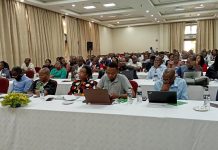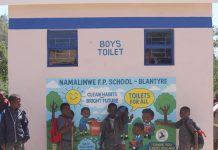Africa-Press – Malawi. A scourge of pit latrines, shallow water wells and uncollected rubbish. This is the toxic combination in a number of townships in Lilongwe City which is the worst hit by the cholera outbreak – alongside Blantyre City.
Malawi is reeling in the worst cholera outbreak in a decade with 795 people killed and a total 23,000 cases registered – as of January 13, 2023 — since the country recorded the first case in March last year.
Over the past week, we visited several townships in the capital city assessing living conditions for many households. The townships we visited include Chinsapo, Mtsiriza, Mtandire, Area 36, Area 38, Area 23 and Chigwirizano.
There we found a considerable number of families depending on water from shallow wells for domestic uses, some even to the extent of using it for drinking.
‘I can’t afford buying water’ Forty-six-year-old Fanny Duncan from Mtsiriza said she cannot afford to buy water for her 10-member family from a kiosk located 30 metres away from her house.
She said she does not have money to buy a 20-litre bucket of water at K25. Instead, her family sources water from a nearby well for almost all domestic requirements.
“I have a big family. I can’t afford to be buying water from the kiosk for that family. I only manage to get one bucket of water for drinking, but when it comes to washing clothes, dishes and bathing, I use water from the well,” Duncan told The Sunday Times at her home in the township.
In Area 36 where cholera has worsened over the past few weeks, Tadala Mtesanji said she draws water from her neighbour’s well. She too said this helps her save some money for other uses. According to her, if she were to depend on water from the kiosk, she would be using not less that K100 a day.
She said she has limited resources to spread around buying water and food for her family. Now, according to the Ministry of Health records, these areas are among those worst hit by cholera in the city.
Feacal contamination Despite the wells being reliable sources of water for the households, a recent study by Lilongwe Water Board (LWB) found that the water in most of the wells is contaminated with feacal coliform which originates from human waste from pit latrines, another prominent feature in the townships we visited.
The LWB study reveals that shallow wells in Lilongwe are contaminated because of the latrines that are close to the wells. In the study, samples were collected from nine shallow wells in Chinsapo, Mtandire, Mtsiriza and Area 36. All the samples tested positive for feacal coliform.
An environmental health expert, Save Kumwenda, said last week that the two cities are the worst hit by cholera because they have large peri-urban areas where people depend on wells, boreholes and river water which are highly contaminated by faecal matter from the toilets, broken septic tanks, broken sewer pipes and open defaecation.
“Most houses in these peri-urban areas do not have adequate toilets and many depend on sharing. In some cases seven to 10 houses share one toilet.
“In addition, most of these households cannot afford to pay for water from the water boards for both drinking and domestic use. The households often prioritise safe water for drinking only and the presence of unsafe water for other uses leads to contamination of foods, utensils and also contamination of the available safe water,” he said.
Kumwenda, an associate professor at the Malawi University of Business and Applied Sciences (Mubas), said the other reason for the high numbers of cholera cases in these two cities is the high number of people who rely on piece works.
“These rely on foods sold in markets where hygiene and sanitation conditions are compromised,” he said. Investing in safe water Kumwenda said there is need to invest in providing vulnerable communities with safe water and improved sanitation facilities.
“We may not have adequate resources but we need to strategise by doing risk assessment to identify more vulnerable communities. These could be prioritised until everyone is reached with safe water and sanitation,” he said.
Minister of Water and Sanitation, Abida Mia, said there are various interventions that water boards are bringing such as extending water pipes, distributing water using bowsers and distributing chlorine to protect people from the current cholera outbreak.
Chairperson of the Parliamentary Committee on Health, Mathews Ngwale, said in most parts of the country including lakeshore areas, people are drinking water that is contaminated with feacal coliform bacteria.
He said this could be averted with chlorine. For example, he said, at one health centre in Mangochi whose catchment area people drink from the lake, cholera cases registered in a day reduced from around 60 to 0 after the households started treating the water with chlorine.
“I would say this is the most successful story we have heard, and we will be recommending this method to many districts where people have this problem,” Ngwale said.
According to the World Health Organisation, globally, at least 2 billion people use a drinking water source contaminated with faeces which poses the greatest risk to waterborne diseases such as cholera.
The United Nations Sustainable Development Goal target 6 calls for universal and equitable access to safe and affordable drinking water. The goal looks at people drinking water from an improved water source that is located on premises, available when needed, and free from faecal and chemical contamination.
According to Unicef, poor sanitation and hygiene are major contributors to the burden of disease and child survival in Malawi, costing Malawi $57 million each year due to health costs and productivity losses. Mathews Kasanda is a journalist who holds a Bachelor of Arts in Journalism from University of Malawi (The Polytechnic).
For More News And Analysis About Malawi Follow Africa-Press






